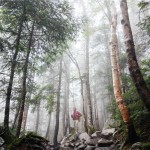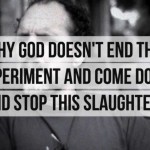We run our website the way we wished the whole internet worked: we provide high quality original content with no ads. We are funded solely by your direct support. Please consider supporting this project.
“Unclean” Animals and the Corruption of Creation
I’ve always been a bit mystified over the distinction between “clean” and “unclean” animals in the OT. I have read several attempts to justify this distinction on the grounds that the former were healthier — or at least less dangerous — to eat, but these defenses never struck me as all that convincing. In his recent book Is God a Moral Monster? (Baker, 2011), Paul Copan offers a much more compelling defense of this distinction (pages 79-84). One aspect of his argument I found particularly interesting was his contention that animals were considered “clean” because they reflect the original order of creation more perfectly than the “unclean” animals and “unclean” because they reflect the effects of the fall more than the “clean” animals.
The connection between the “clean” and “unclean” distinction, on the one hand, and the creation and fall, on the other, is reflected in the book of Leviticus by the repeated phrases “you may eat” and “you shall not eat” (Lev. 11:3, 9, 11, 21, 22) which, Copan argues, echo the provision and prohibition to Adam and Eve in the garden (Gen. 2:16; 3:2). This connection arguably explains why predators and animals that had been preyed on were prohibited (Ex 22:31; Lev. 17:14) for, according to the Genesis narrative, the original creation was non-carnivorous (Gen. 1:31). Even when humans were permitted to eat meat after the flood they had to first drain the blood out, for the blood was (and is?) considered sacred (Gen. 9:4). Hence, animals that prey on others and consume their blood are, to this degree, out of sync with God’s creational design.
What I find most significant is that this explanation of the “clean” and “unclean” distinction presupposes that nature has been significantly affected by the fall, as the Genesis narrative itself suggests (Gen. 3: 14-19) and other passages of Scripture confirm (e.g. Rom. 8: 19-22). The very fact that Satan is said to hold the power of death (Heb 2:14) reveals how thoroughly creation has been corrupted, for it means that, at least as we now experience it, there is nothing “natural” about death. So too, the fact that the New Testament consistently depicts physical infirmities as directly or indirectly due to Satan and demonic influences makes this point as well.
As I argued on this blog several years ago (it was actually several blog posts sprinkled throughout 2007 beginning here), the view that nature itself has been corrupted by fallen spirit agents has enormous apologetic value, for it means there is no such thing as “natural evil.” While we should avoid the nonsense of claiming there’s a specific demonic force behind every physical infirmity or every “natural” disaster, we can and should nevertheless claim that, were it not for the corrupting influence of Satan and demonic powers in nature, there wouldn’t be any physical infirmities or “natural” disasters. For the same reason, it also means we don’t have to accept that infirmities and disasters are “acts of God.” And, as I argued in an essay entitled “Evolution as Cosmic Conflict” (included in T. Oord, ed., Creation Made Free, Pickwick, 2008), this perspective also helps explain why the evolutionary process leading up to humans was so remarkably violent. (I address the apparent conflict between this perspective and Gen. 1:30 in my essay).
So, the next time you see a “natural” disaster, experience a physical infirmity, encounter a death, witness an animal ripping another apart or (if you must), bite into one yourself, remember that the creation wasn’t originally meant to be this way, and one day it will be so no longer (Isa 11:6-9).
Peace
Greg
Category: General
Tags: Animals, Problem of Evil
Related Reading

Lord Willing? Part 3
In this final segment of Greg’s discussion with Jessica Kelley about her book Lord Willing?, Jessica talks about how to respond to someone who is grieving or in crisis. You can find part 1 here and part 2 here. We’re so grateful that Jessica took the time to share her story with us. We know…

Christians and Creation Care
Image by Ali Inay While the mustard seed of the Kingdom has been planted, it obviously hasn’t yet taken over the entire garden (Matt 13:31-42). We continue to live in an oppressed, corrupted world. We live in the tension between the “already” and the “not yet.” Not only this, but we who are the appointed landlords…

Divine Wisdom
Why doesn’t God end it all and stop the slaughter? Why does God allow suffering and evil to go on so long? Here, Greg offers two possible answers to these questions. Option A is that all evil somehow is designed by God and somehow brings glory to him. But Greg thinks Option B is a better explanation, and it involves…

Life and Death in Haiti
Sometimes it’s important to hear about other lives, much sadder and difficult than our own, to reorient us to what is most important. In this season of elections that can be so divisive and in an economy that seems so fragile and creates hardship for many of us, it’s important to remember that we are…

A Cross-Centered Evaluation of Responses to Tragedy
I’d like to pick up where I left off on my previous post about Draper’s article entitled “Aurora shooting inspires various perspectives on God and belief.” Toward the end of his article, Draper reports on an informal survey conducted by Stephen Prothero on his CNN Blog. Prothero simply asks people to respond to the question: “Where…

If God Can’t Control, How Can I Trust Him?
Question: If God can’t always answer our prayers for healing, for example (and I completely understand why—free will etc), then HOW can he promise to bring good out of the bad things that happen? Surely he is powerless to do that too? And if he can bring good why can’t he therefore heal in the…
